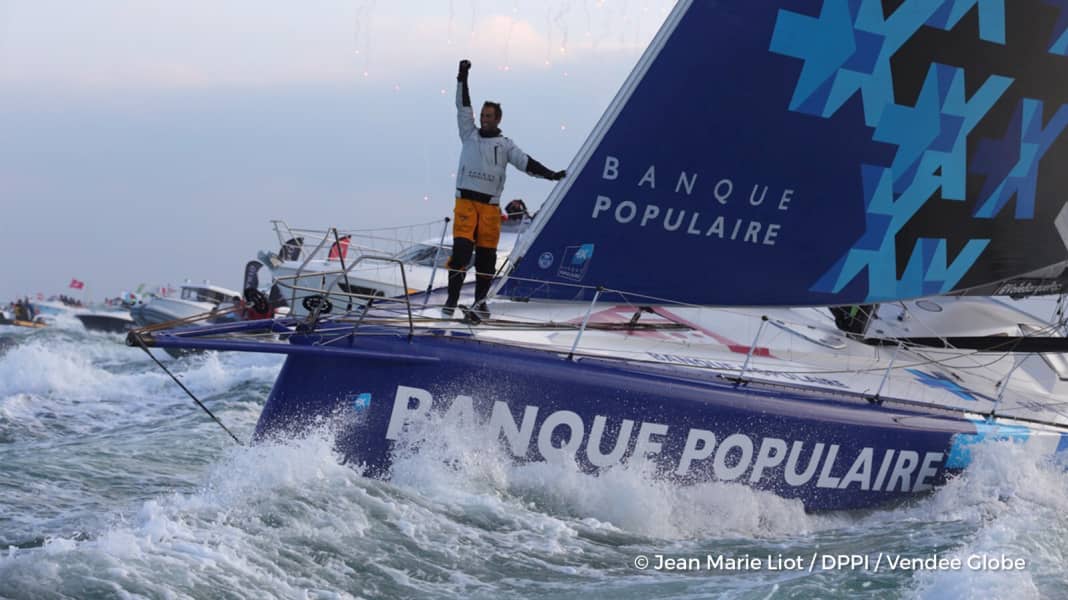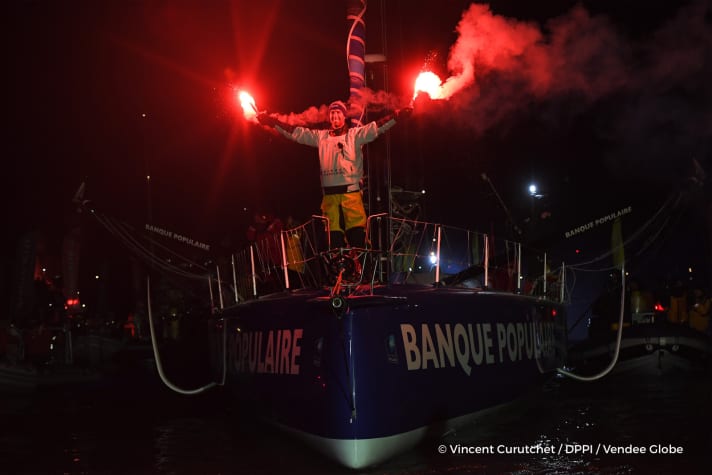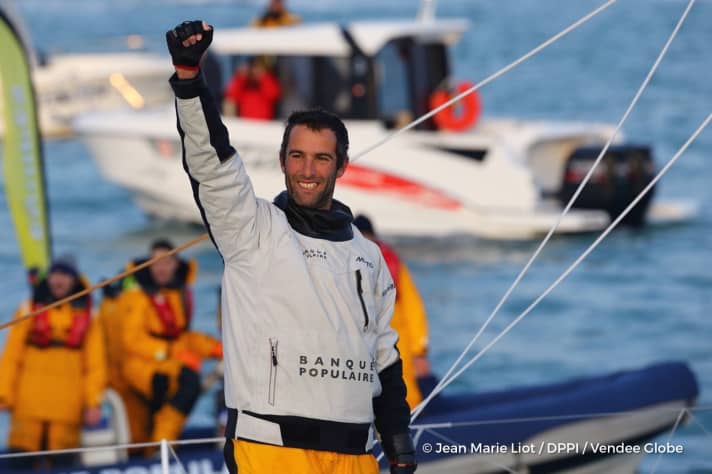
Arms raised, a broad smile on his face: this is how the 39-year-old Breton crossed the finish line. The next gesture was for his boat "Banque Populaire VIII": Armel Le Cléac'h kissed the deck of his Open 60 immediately after crossing the finish line. With his time, he beat François Gabart's existing record from 2012 by almost four days.
Shortly before the entrance to the canal to Les Sables d'Olonne, things get even more emotional: when a reporter comes on board to interview the winner, it is only enough for a few sentences, then his emotions get the better of him and the Breton starts to cry, struggling to find the words for several minutes. It's a moving moment and you can tell how important this victory is to the two-time runner-up. "It's a dream come true for me. I wanted to win this race twelve years ago. Today is a perfect day!"

"I thought everything was against me in the North Atlantic. I was so far ahead and then Alex kept coming in. Every time the weather forecast was bad, I ran through the boat swearing! The support of my many fans really helped me through those moments." The pressure was obviously enormous until shortly before the finish. Then he revealed a well-kept secret: the Frenchman had not been able to use the G-1 headsail since the Pacific because the hook to attach it to the masthead had broken.
"It was only when I had Ouessant abeam that I really believed I could win!" There is no other sign of damage to his "Banque Populaire", the ship looks almost immaculate as it did at the start, with just a few rust noses running down the cockpit and a few strips of rope hanging loosely from the spreaders.

"Alex pushed hard the whole time, it was a very exhausting race, he is a worthy second!" He was only able to catch his breath at Cape Horn, but then came the Atlantic, which made it so difficult with the many high-pressure cells with light winds. He would also like to thank his people on land, who were "a dream team" and made the victory possible in the first place. It was only with the newly built boat (in 2012 he had sailed with a previously bought second-hand Open 60) that it was possible to win because it was perfectly tailored to him and his way of sailing.
After having to wait around an hour until the tide had pushed enough water into the canal to Les Sables, he ran into the harbour standing at the bow, waving flares. The Breton then made a very fresh, fit impression on the dock, the adrenalin certainly contributing to this. At the end, the obligatory bottle of champagne was sprayed and then the party began.
This is still some way off for Brit Alex Thomson, who is not expected to arrive in Les Sables d'Olonne until the early hours of the morning between 4 and 5am.
The Vendée Globe has once again lived up to its reputation of being the toughest regatta in the world. The duel between Britain's Alex Thomson and Armel Le Cléac'h, which was fought with almost brutal rigour all around the globe, kept sailing fans all over the world on the edge of their seats for over two months. Initially tied in the first few days, the Brit gambled early in the race in a risky weather extreme and fell back while in the lead. Just when it looked like Armel Le Cléac'h would be able to pull away and take a commanding lead in the race, Thomson overtook him with a spectacular route through Cape Verde, much further east than the rest of the field. A sensationally good Doldrums passage put him back in the lead and he never relinquished it until the Cape of Good Hope. On the contrary, his "Hugo Boss" proved to be the fastest ship in the fleet and extended his lead to over 100 miles.
But then fate struck mercilessly: on 19 November, Thomson rammed flotsam with "Hugo Boss" and broke his starboard foil. The speed advantage was gone and the Briton was overtaken by his pursuers Armel Le Cléac'h and Sébastien Josse. Josse dropped back shortly afterwards with damage, and from then on the two leaders fought a fierce duel. Thomson kept up well in the Indian Ocean, but had to get the very last out of himself and his boat to keep up. Whenever he was able to sail on the port bow, on which his remaining centreboard was working, he was faster and caught up; on the other bow he slowly sank astern.
Shortly before Cape Leeuwin, the two were practically neck and neck and the race was still wide open. It was only in two 55-knot storms, in which the Briton had to switch to "survival mode", that Le Cléac'h managed to pull away with bravura determination. And this lead of almost 100 nautical miles was enough for him to set off in the Pacific in a different weather system. Thomson got caught in the light wind and the Frenchman escaped with the next low towards Cape Horn. His lead there was a whopping 800 nautical miles when he passed the last major landmark.
But this time the gods were against Le Cléac'h: two large doldrums up the South Atlantic and good conditions for Thomson allowed the Briton to close the gap to just under 40 miles. Once again he had an optimal Doldrums passage and was within striking distance at times with just under 50 nautical miles. But then the likeable Brit, who has won many fans with his always cheerful videos from on board despite all the adversity, was hit hard again: his wind instruments failed and for weeks he was unable to set the autopilot according to the wind angle - the worst case scenario for an Open 60. He did manage to rig a replacement on deck on a pole, but the boat's performance suffered visibly.
The Brit then launched a final attack with the determination of a desperate man: In good conditions three days before the finish, he got everything out of his boat once again and sailed a new 24-hour record, taking 34 miles off the leader in one day. But Armel Le Cléac'h put up a determined fight: Whenever Thomson caught up, he parried the attack a little later with another excellent performance. The Frenchman sailed cleverly, always under control, protected his boat from any major damage and has now realised his dream.

